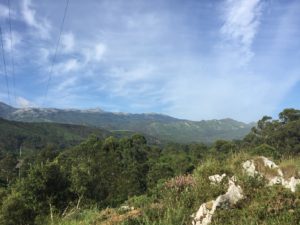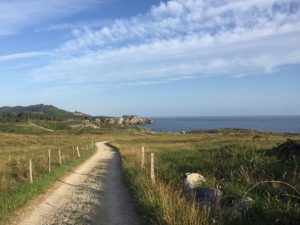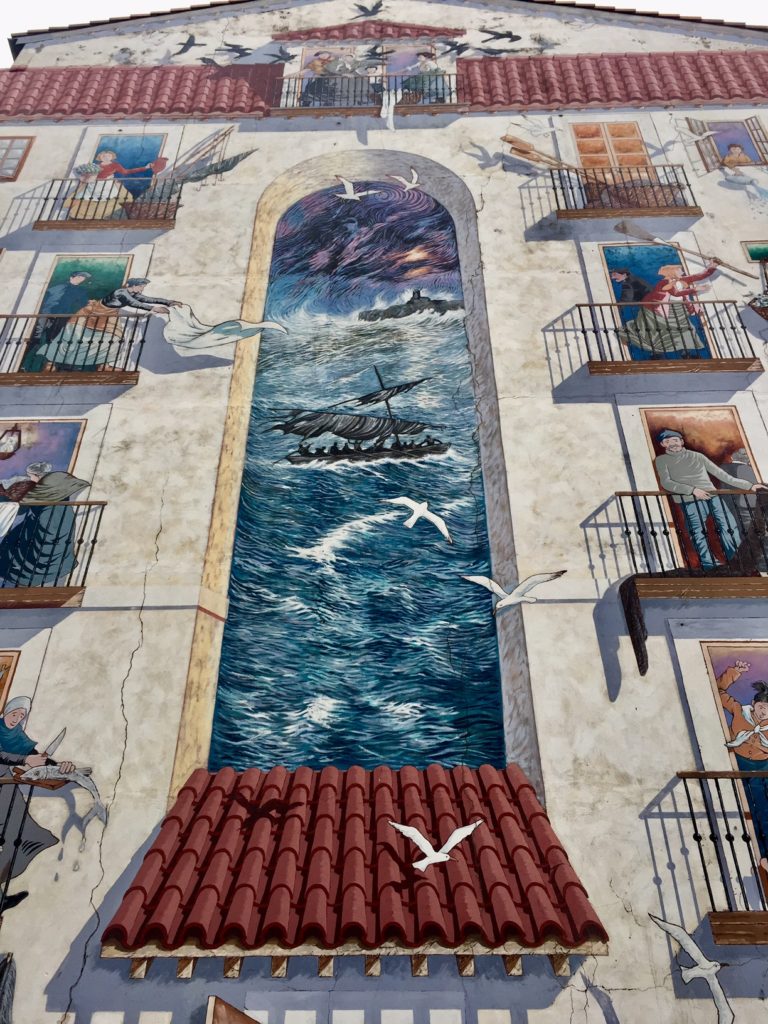stuck with you
I found myself making up new words to old songs, singing endless rounds of such classic hits as Steve Miller Band’s clowns to the left of me, jokers to the right, here I am, “Stuck In the Middle With You”:
Camino is to walk in the way
that you want to walk every day
it’s so hard to get up out of this bed
and walk with all the stuff in my headmountains to the left of me
ocean to the right
here I am
stuck on Camino with youyeah I’m stuck on Camino with you
and I’m wondering what it is I should do
yellow arrows all point the way
unless they point the other waymountains to the left of me
ocean to the right
here I am
stuck on Camino with youwell I started out with nothin’
and now I got nothin’ left;
when your back’s against the mountains
look at all the beaches
say hmm mm mm mm mm mm
hmm mm mm mm mm yeah….
If I was doing the Camino wrong, I didn’t wanna be right. Yesterday, it rained, rained desperately, like tears of grief that would never stop, and I spent the day covered, my pack covered, seeking cover during the heaviest downpours under porches of chapels, or cafe awnings where locals held the door open for me to come in, aqui, aqui. Hiking in the rain was a gray, solitary pursuit, ameliorated by my new rules of Camino play: rainy days are unlimited coffee days! I made a game of finding as many coffee opportunities as I could without deviating too far from the path.
Every time I sat at a long bar or a small table, and the bar man set my tiny white cup of thick espresso and cream before me, I smiled. Every single time. I smiled across the Atlantic Ocean, 5,000 miles west, toward my daughter in Boston. Emma. Her credo: always take time for a coffee. “Salud,” I would offer as my lips met the rim of the cup. Health…for us both.
Emma had been my traveling companion for a long time now, though she was only recently out of college and into her first professional job. My fourth child, of star-crossed passions, she streaked across our sky and beyond us like a comet. This fiery spirit stood defiant on all things worth fighting for, graciously folding her flaming phoenix wings and allowing me to approach her with tantalizing treats in my outstretched hands, such as her baby bottle of milk, or a cookie, or her blankie. Because Emma was the fiercest baby you ever met, a toddler standing firm against the impending doom of her mama counting, “1…2…3…” while her older siblings peeked around the corner in terror and in awe, whispering to each other, “Oh god, Emma – what happens at five? What happens at five?” She survived. If I put her in her room for a time out, she kicked against the door, hurling her tiny body against it, refusing to be confined, or silenced. She thrived.
My intimidation techniques had absolutely zero effect on the glory that was Emma. And so, seeing that I was outgunned, I gave them up. Instead, I resorted to bribery. Because the treat that most tantalized this tiny beastie – was coffee. Mother of the Year would feel a tiny tug on her pant leg, and look down from reading the paper to see an adorable face turned beseechingly upward, angelically asking, “Widdo taysee?” If she was behaving, then, with a practiced slurp, she got a little taste of my creamy coffee.
And thus we became pals.
By the time she was in middle school, we both enjoyed going to coffee shops. By high school, we were regularly meeting up there to write together, taking a hot sip and dashing off lines in a notebook to prompts we created on the spot. I loved to see her eyes flash as we listed three random words or phrases to be included and then said, “Go!” Scribble, scribble, scribble, her hand worked in rapid circles, while I dashed my slanting arrows into the list and then called, “Time!” Our agreement: keep it short. Our editing practice: don’t edit. Say it and be done with it. Next.
But we had a problem, and it was me. I got sick. Accustomed to good health, I had no regular doctor, so I pinballed from one to another as they tried to figure out what was causing my symptoms. Finally, a routine checkup pointed the way.
I had HPV. Not the easy kind, the kind that arrives like an awkward guest but then leaves and never returns. Not the embarrassing kind, the kind that gives you warts in places you’d really rather not have them and makes you feel like the awkward guest threw a filthy, disgusting, all-night kegger in your home, coming back periodically with the lie that this time, no parties, swear.
No, my HPV was the mean kind. My HPV was the clever, sweet-talking professional guy who brought you flowers and told you that you were the only woman in the world, and by the end of your relationship, he was standing over you in bed, ripping the blankets off at one in the morning and yelling that this conversation is not over yet. Because it wasn’t over yet. This abusive relationship would never end. I had persistent, high-risk HPV; it refused to leave, even if I got a restraining order and changed my locks. It was trying to kill me. With cancer.
When the older kids came home for Christmas, I went in for surgery, thinking to burn the HPV out. Homewrecker that it was, it hid, then created infection and mayhem. So two months later, I had another surgery, removing everything – not just cervix, but uterus, ovaries. Do it and be done with it. I would not lose this fight.
And neither would Emma. Just a kid in high school, 17-year-old Emma got herself to and from classes, to and from work. As the double-whammy effect of double-surgery anesthesia knocked my central nervous system around like a series of punches to the head, I made the medical circuit again, cardiology, neurology. And Emma hung in there with me, encouraging, smiling, offering me a little tasty coffee, from her job at the downtown coffee shop. She stood firm, scared but invincible, and at the end of the spring, we made it to her sister’s college graduation. And a few years later, I made it to her own college graduation, from Colorado all the way to the east coast, to Boston. Thousands of miles.
Emma was the baby soothed if I sang to her. I was performing on stages in Denver when she was born, and she refused to be left out of all those songs she’d been hearing in utero. So when she was an infant, I held her in my arms, under the spotlight, and I sang. I sang all my words, pain or joy, in all my tunes, melodious or melancholy, and she was right beside me.
Twenty-three years later, my gate was boarding at Logan Airport in Boston, the plane bound for Spain. Emma handed me a card, one we’d found together on my first trip anywhere, my trip to New York. The trip Emma encouraged and cajoled me into, so that I would finally travel.
Off you go.
And if things had been different
maybe you would have done this already
maybe you would have had different kids, fewer kids, no kids at all
maybe your life would have had a different story
maybe you wouldn’t care so much about people
maybe you would care more about people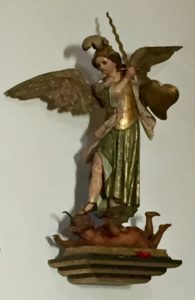
and still.
Here we are.
And this is your life.
Fly away and live it.
No kids at all. When I had my own glorious phoenix, standing guard over my dreams like a fiery, rebel angel sent from the stars.
* * * * * * * * * * * * * * * * *
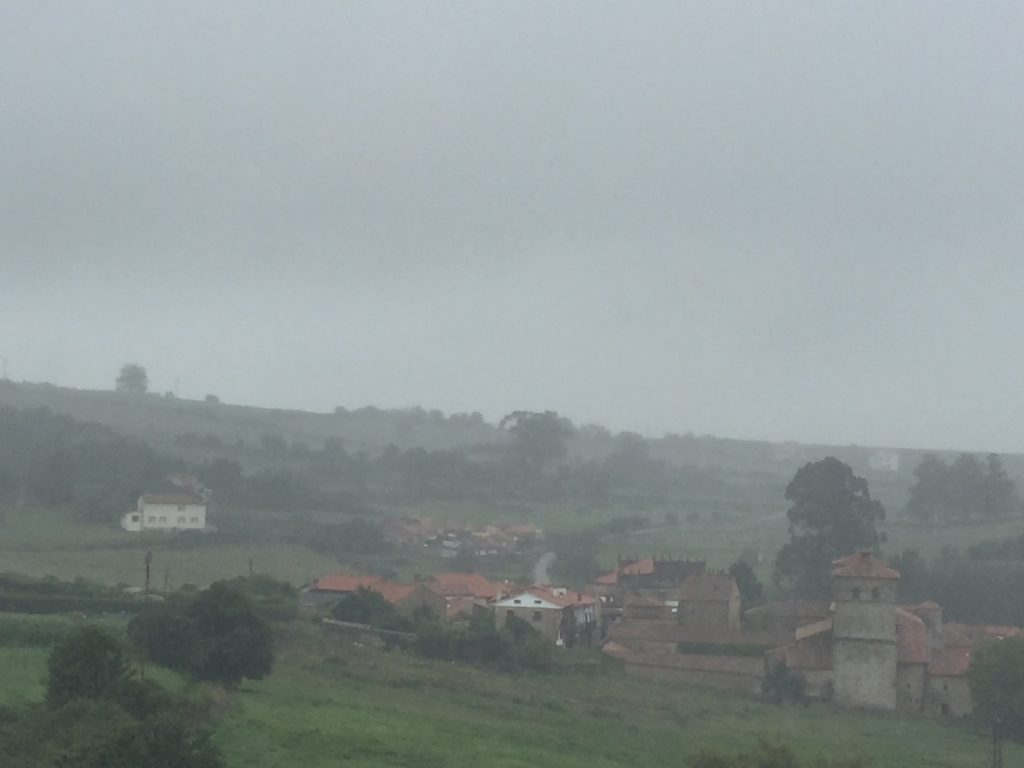 Instead of going to Pendueles, I stopped 2 km short. The rain was unrelenting, and as I hesitated at a crossroads looking for a sign, I heard my name: “Barbara! Won’t you come and stay with us?” It was Saulomon and Karolin, hanging out of an open second-story window over a bar.
Instead of going to Pendueles, I stopped 2 km short. The rain was unrelenting, and as I hesitated at a crossroads looking for a sign, I heard my name: “Barbara! Won’t you come and stay with us?” It was Saulomon and Karolin, hanging out of an open second-story window over a bar.
“Is that an albergue?” I asked, squinting as rain hit my eyes.
“Oh, yesss,” Saulomon purred, “warm and dry.” He grinned, delighted with himself.
“Yes, come!” Karolin called down. And so I came in out of the rain.
As my clothes and jacket and towel all spun in an unexpected clothes dryer, I stopped downstairs in the bar for a snack. I saw a beautiful, round cake that reminded me of Marisa’s. “What is the word for this cake?” I asked a peregrino beside me at the bar.
The bar man saw me looking and pointing. “Bizcocho,” he answered, adding more I could not understand.
“And it’s homemade,” the peregrino translated.
“Si, señor, bizcocho, y cafe con leche, por favor,” I told the bar man, who nodded. It arrived warm and satisfying. Salud, Em. I have to teach you this magic word: bizcocho. Emma was still traveling with me, beside me every step of the way, sharing every cup of coffee, her card bookmarking where I’d left off in my notebook, reminding me as I opened it that I was not alone. Go live your life. My pen began scribbling the slanting arrows of my thoughts into the prompts the day had provided.
To come in out of the rain is to finally gain some sense, they say; but in practice, it was not so much common sense I was learning, as trust. To seek shelter in a storm requires that you stop blindly struggling on alone, and find people who will stick with you, call your name, sing along. It’s to start to figure out that life can be easier than you’re used to, better than you thought possible. To find a place where you can feel safe, welcome to come in and warm yourself by the fire, or by the dryer, or by the homemade bizcocho, and coffee. Salud.
